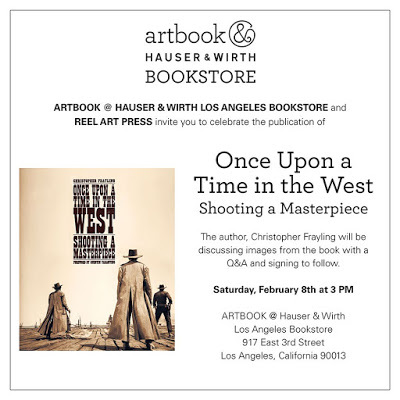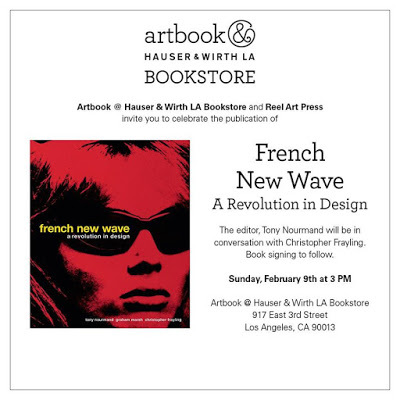Tosh Berman's Blog, page 127
March 1, 2020
BOOK MUSIK 18: "William S. Burroughs and the Cult of Rock n' Roll" by Casey Rae (University of Texas Press_
Tosh and Kimley discuss William S. Burroughs and the Cult of Rock ‘n’ Roll by Casey Rae. William Burroughs has always been a magnet for the music crowd. Icons as diverse as Bob Dylan, David Bowie, Patti Smith, Jimmy Page, Thurston Moore, Kurt Cobain and so many more have all made a pilgrimage to sit at the feet of the outlaw writer. Steely Dan and Soft Machine cribbed their names from Burroughs and countless others have cited his cut-up technique as an inspirational tool. Now considered classics, books like Naked Lunch, Junky, and Queer were not so gently pushing the boundaries of polite society and challenging obscenity laws. It’s no wonder the rock ‘n’ roll crowd came knocking.Also here is our playlist of music to go along with the William S. Burroughs episode of Book Musik:Spotify Burroughs PlaylistApple Music Burroughs Playlist
Published on March 01, 2020 07:52
February 27, 2020
Critical Praise for "TOSH: Growing Up in Wallace Berman's World" by Tosh Berman (City Lights Publishing)
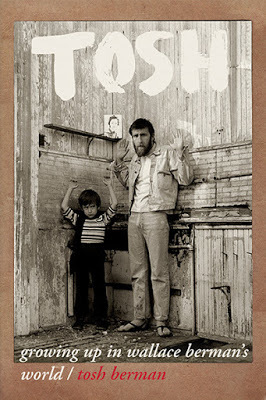
Praise for Tosh:
"Tosh Berman's sweet and affecting memoir provides an intimate glimpse of his father, Wallace, and the exciting, seat-of-the-pants LA art scene of the 1960s, and it also speaks to the hearts of current and former lonely teenagers everywhere."—Luc Sante, author of The Other Paris
"This book is like a fascinating series of autobiographical post-cards that could be subtitled, Growing Up Semina. As the son of artist Wallace Berman, Tosh presents fly on the wall impressions of his parents coterie in the 60s and 70s—a grouping that included such luminaries as Dennis Hopper, Brian Jones, Toni Basil, and Andy Warhol. His memoir give us a glimpse into the 'other' Los Angeles—a bohemia that thrived in the 60s and 70s in numerous enclaves such as Topanga Canyon, Venice Beach, and West Hollywood. This is the story of a kid growing up inside of art world history, retelling his upbringing warts and all. A well-written, fast-moving book that is candid, funny, often disturbing, and never dull."—Gillian McCain, co-author of Please Kill Me: The Uncensored Oral History of Punk
"As the son of artist Wallace Berman, Tosh Berman had a front row seat for the beat parade of the '50s, and the hippie extravaganza of the '60s. It was an exotic, star-studded childhood, but having groovy parents doesn't insulate one from the challenge of forging one's own identity in the world. Berman's successful effort to do that provides the heart and soul of this movingly candid chronicle of growing up bohemian."—Kristine McKenna, co-author of Room to Dream by David Lynch
"Through the prism of Tosh Berman, only child, born 1954 to Wallace and Shirley, who personified the wild heart of 20th century West Coast art, we are offered a truly intimate invitation into a magic world of outliers, visionaries and shooting stars.TOSH recounts a life 'lived like a good book on a bookshelf,' a memoir resonant with discovery, passion, music, art, sex, celebrity, ego, desire, and dignity. All told with a son's love for his father, a continuing light into the creative life."—Thurston Moore, musician & writer
"This book is sublime: vertiginous, melancholy, highly amusing!"—Johan Kugelberg, Boo-Hooray
"One could not wish for a better guide into the subterranean and bohemian worlds of the California art/Beat scene than Tosh Berman, only scion of the great Wallace. Tosh has a sly wit and an informed eye, he is both erudite and neurotic, and often hilarious. TOSH, the book, is packed with keen observations and unique anecdotal factoids that could only come from a true insider. It's a must for anyone who cares about California counter-culture and the raggedy-ass drumbeat of the Beat Generation."—John Taylor, Duran Duran
"Tosh Berman is one of the most valuable writers, much less people, the earth has upon it. This book is exquisite. I can't think of another word. What it says, how it says it, what it is."—Dennis Cooper, author of The Marbled Swarm
"I first met Tosh Berman when he was assigned to sit next to me in 5th grade. We rode the Topanga school bus together for many years and even drove with each other to our high school graduation. But the overlap doesn't end there. Our parents frequented many of the same movie theaters, clubs, and galleries. Neither of our mother's drove, either. Both of our families had the celebrities of the day passing through our houses. I witnessed much of what Tosh saw and writes about, and I can say that TOSH: Growing up in Wallace Berman's World captures the times, places, and people with accuracy, sensitivity, humor, and, at times, great sadness. This is a beautifully written memoir, and I highly recommend it to those who are interested in the Sixties, Topanga Canyon, the Southern California art scene, and for those who wonder what it might mean to grow up as the son of one of our most acclaimed artists."—Lisa See, author of The Tea Girl of Hummingbird Lane
"Reading TOSH, I felt like I was lying on a couch, completely relaxed and engrossed, while Tosh Berman sat in a chair beside me and told me his amazing life story. And at the end, I was very moved and wanted to cry. The affect that TOSH—the book and the man—had on me was that feeling I get when exposed to great art: a mix of sadness and wonder, which seem to be the two faces of the human heart. Wonderment at the beauty around us—the world, its people—and the sadness that nothing lasts, that all must perish. But this is our journey on planet earth: to be brave and feel both things at once, and it's great art, like this book, that reminds us to do so."—Jonathan Ames, author of You Were Never Really Here
"If you are interested in California bohemian art-scene culture, eccentric and fascinating family and friend dynamics between unique individuals, and celebrated yet oddly little-known artists with uncompromising personalities, then read this book!"—Roman Coppola, filmmaker, screenwriter
"This book is perfection. I wish it went on forever. Maybe, somehow, it does.TOSH is almost like a giant map of small city . . . Each sentence is a street. Each chapter is an era. Each memory revealing a secret passage from one place to the next . . . TO READ IT is to WALK IT with Tosh Berman." —Jason Schwartzman, actor
"Tosh Berman paints an intimate and heartfelt portrait of growing up within the quirky West Coast counterculture of the 1950-70s. At the center of the tale is his dedicated and passionate artist father, Wallace Berman, who introduces his son to a bizarre collection of artists, crooks, cowboys, beatniks, hippies, freaks, filmmakers, musicians, mystics, and assorted weirdos. Including hilarious personal stories about Dean Stockwell, Dennis Hopper, Allen Ginsberg, Cameron, Ramblin' Jack Elliott, Michael McClure, Robert Duncan, George Herms, Leslie Caron, William Burroughs, Andy Warhol, Russ Tamblyn, Lenny Bruce, Phil Spector, Brian Jones, Alexander Trocchi, John Cage, and many many more, TOSH, is a delightfully entertaining memoir filled with sly wit and a profound personal perspective."—John Zorn, composer
"There's the life—and then there's the life. With TOSH you can have both. My life, and that of many who sailed with me, was formed by the 40's & 50's. TOSH takes you there. Feel the fabric, touch the canvas of all that informed us. Embrace it and move forward."—Andrew Loog Oldham, producer/manager, The Rolling Stones
"This double narrative of Tosh Berman and his father, Wallace, will tell you more about the creative process than a hundred how-to books purporting to do the same. Joyous and unselfconsciously readable, it celebrates the delights of surprise and observation on every page, as well as, yes—the confidence that things will somehow land upright."—Jim Krusoe, author of The Sleep Garden
"What compels about Tosh Berman's gorgeously written memoir is the proximity of the quotidian and the familiar to the extraordinary, the shocking even, and the enviably glamorous. He recounts a coming of age in which the unexpected laces the ordinary as surely at it does in Alice In Wonderland—only for Tosh, growing up, a cast of artists, nutcases, iconoclasts, stars, and extremists of all kinds provide the distraction and disruption once supplied by the White Rabbit or Cheshire Cat. Add to this his exemplary taste in, and understanding of, a particular pop sensibility—TV, music, Warhol, and comic books. That then heady and head-spinning world, soundtrack to a sentimental education, that was for the young romantics of the mid-twentieth century what clouds and peaks were to those of mid-nineteenth. Brava, Tosh Berman!"—Michael Bracewell, writer
"If the first movie your father takes you to as a child is . . . And God Created Woman, you can be sure of two things. First, that your father is an extraordinary person. Second, that you are destined to lead an extraordinarily interesting life. Both of these suppositions are made evident in Tosh Berman's vivid and loving memoir, TOSH: Growing Up in Wallace Berman's World. What a world!"—Ron Mael, Sparks
"Reading TOSH is like meeting your idols, one at a time, for a quiet chat. Everyone is disarmed, and it feels like you've been in the same room with them for about ten hours, or so. Dennis Hopper is unconstrained and friendly, Toni Basil is bubbly, and Brian Jones has just stopped by to say hello. Topanga, as a place is remote—filled with pockets of escapism, winding landscapes of tumult and ennui. Tosh's world is both expansive and crystalline, he traces the edges of his world, and Wallace's world. We get to come and go with Tosh as he navigates his place in and around the tangle of the time."—Soo Kim, artist, Professor at Otis College of Art and Design
"Sexually giddy, clairvoyant, messianic—Wallace Berman's socially astute photo-collages were vital bread and butter for several generations of artists. The Wallace B bloodline, from which Tosh sprouted, is a verdant gene pool. For artists-readers, TOSH, the memoir, is a luscious document of Los Angeles in the last four decades of the 20th century. Every page is filled with juicy history. Such surprises include a teenaged Sammy Davis Jr. sleepover, a pet alligator, Mae West, Allen Ginsberg, and dozens of remarkable side characters. Bask in Tosh Berman's honesty and gentle style. He is a one-of-a-kind gem."—Benjamin Weissman, artist & writer
Publisher City Lights PublishersFormat PaperbackNb of pages 328 p. ISBN-10 0872867609ISBN-13 9780872867604
Published on February 27, 2020 10:56
February 15, 2020
BOOK MUSIK 17: Tony Nourmand & Dave Brolan (Reel Art Press)
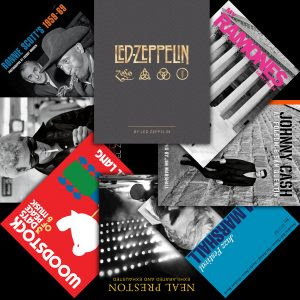
Tosh and Kimley discuss the books of Reel Art Press with special guests Tony Nourmand (the founder and editor in chief) and Dave Brolan (the music editor.) Reel Art Press publishes stunning books on an eclectic array of subjects usually with a music, film or pop-culture foundation. Tony and Dave, both enormously passionate about what they do, regale us with some fantastic and often amusing stories about running an independent press and working with the likes of Led Zeppelin and some of the most iconic music/rock photographers in the biz. Each of their books brings a unique perspective and is a piece of art in and of itself.
Reel Art Press with Tony & Dave
Published on February 15, 2020 10:01
February 7, 2020
"Badass Babe!, Sex & Fury & Other Stories" by Bonten Taro (Black Hook Press)
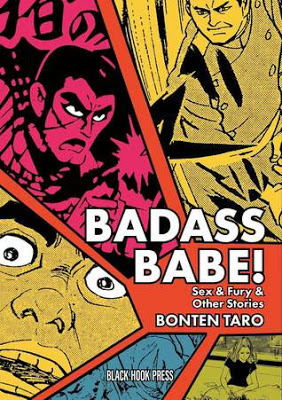 9784990744014 Black Hook Press
9784990744014 Black Hook PressI knew nothing of Bonten Taro, but after reading his manga "Badass Babe!, Sex & Fury and Other Stories," I'm now a fan. Taro is obsessed with the world of tattooing as well as Yakuza culture. His stories as themselves are not that brilliant, but the combination of drawing talent and focus on revenge, strong female characters, and the over-the-top violence is a glorious cocktail of delight. He is the Mickey Spillane of the Japanese Manga world. Black Hook Press, out of Japan, did a magnificent job in presenting Bonten's work in this beautiful and pulpy edition.
Published on February 07, 2020 19:24
"Once Upon a Time in the West: Shooting a Masterpiece" at Artbook at Hauser & Wirth Los Angeles
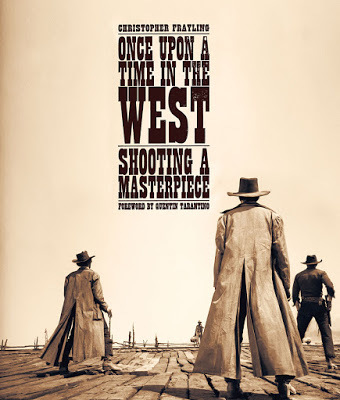
"Once Upon a Time in the West: Shooting a Masterpiece" (Reel Art Press) is a masterpiece of a book. The author Christopher Frayling will be at Artbook at Hauser & Wirth Los Angeles, discussing his book on a film that changed in what we think of the Western genre. Not only that, but Sir Frayling is an expert on the Spaghetti Western. The book, in-depth, discusses the Italian film industry and its artists. Not only on the genius of Sergio Leone, but also the brilliant soundtrack music by Ennio Morricone and the script by Dario Argento, Bernardo Bertolucci, and Leone. Sir Frayling will present this beautifully illustrated book that is essential to the film fanatic but also the fascinating history of the Spaghetti Western. The event will take place on Saturday, February 8th, at 3 pm.
Artbook @ Hauser & Wirth Los Angeles917 East 3rd StreetLos Angeles 90013
Published on February 07, 2020 19:02
February 6, 2020
French New Wave: A Revolution in Design" Edited by Tony N...
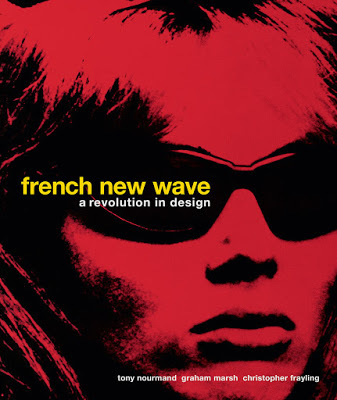
French New Wave: A Revolution in Design" Edited by Tony Nourmand. Introduction by Christopher Frayling. Design by Graham Marsh. Text by Alison Elangasinghe.The French New Wave, of course, has a presence as cinema, but also, and equally important is how the international graphic arts contributed to these markable films. I believe most of us who were touched by the French New Wave was first seduced to its greatness by its movie posters. In an obsessive (and love is always obsessive) manner, we look at the graphic genius of Jean-Michel Folon, Boris Grinsson, Waldemar Swierzy, Christian Broutin, Tomasz Ruminski, Hans Hillman, Georges Allard, René Ferracci, Bruno Rehak, Zdenek Ziegler, Miroslav Vystrcil, Peter Strausfeld, Maciej Hibner, Andrzej Krajewski, Maciej Zbikowski, Josef Vylet’al, Sandro Simeoni, Averardo Ciriello, Marcello Colizzi and many more. From France to the U.S. to Poland, Japan, and elsewhere, The French New Wave was a foundation where graphic art was made and equally as important as the actual films.The editor Tony Nourmand will be in conversation with Christopher Frayling. A book signing will follow. At Artbook @ Hauser & Wirth Los Angeles, 917 East 3rd Street. Sunday, February 9th at 3PM. - Tosh Berman
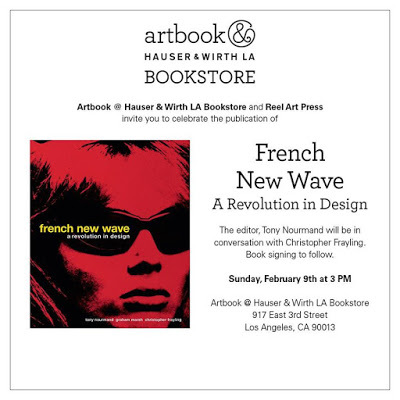
Published on February 06, 2020 13:56
February 5, 2020
Two Artbook at Hauser & Wirth Los Angeles Events that Excite Me - Reel Art Press (RAP)
Published on February 05, 2020 09:22
February 1, 2020
BOOK MUSIK 16: Bowie's Bookshelf by John O'Connell
Tosh and Kimley discuss Bowie’s Bookshelf: The Hundred Books that Changed David Bowie’s Life by John O’Connell. Any serious Bowie fan knows that Bowie was a voracious reader and the epitome of an autodidact. In 2013 the Victoria & Albert Museum had a David Bowie exhibit and Bowie graced us with an additional memento which was this list of 100 books that changed his life. John O’Connell dissects each of these books and tries to surmise the specifics of influence and import to Bowie. It’s an impossible task but an amusing one that leads to further discussion on one of our favorite topics: David Bowie!
Published on February 01, 2020 08:10
January 15, 2020
Book Musik 15 - Tony Conrad Writings with Guess Andrew Lampert
Book Musik 15 – Tony Conrad WritingsPosted on January 15, 2020 by Book MusikTosh and Kimley discuss Tony Conrad Writings with special guest Andrew Lampert who co-edited the book with Constance DeJong. Conrad is primarily known for his work as a musician/composer, an experimental filmmaker and artist. He was a hugely influential key figure in the early minimalist music scene in New York in the 1960s. Wanting to explore other modes of creativity he then pushed up against the confines of the film-going experience with films like “The Flicker” and “Yellow Movies.” Always curious, always questioning, Conrad never ceased to be doing something new and unexpected. His Writings give us just one more wonderful chance to go down the rabbit hole with him.
Published on January 15, 2020 08:01
January 5, 2020
Playlist inspired by Wendy Carlos
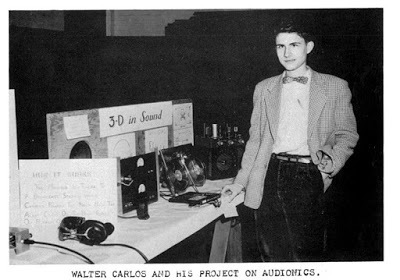
Spotify Wendy Carlos inspiration music
Apple Music Inspiration Wendy Carlos Music
And listen to the episode of Book Musik on Wendy Carlos: /book-musik-014-wendy-carloss-switched-on-bach-by-roshanak-kheshti
Published on January 05, 2020 19:32

